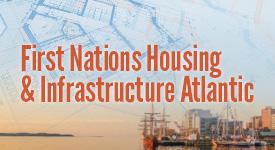Atlantic Convention on Indigenous Affairs
















As Mayor of Halifax and on behalf of Regional Council it is my distinct pleasure to extend warm greetings and a special welcome to all attending the Atlantic Convention Indigenous Affairs: Consultation, Housing, Cumulative Effects


Halifax Regional Municipality is located on the ancestral and unceded grounds of the Mi’kmaq people in the district of Mi’kma’ki. We acknowledge the Peace and Friendship Treaties signed in this Territory and recognize we are all Treaty People.
Delegates of the 6th annual conference will be provided a non-partisan platform to make meaningful connections and engage in important discussions with Indigenous leaders, natural resource experts and key government officials.
Halifax is the place to be with its dynamic and intriguing mix of heritage and culture. Indeed, the Mi’kmaq people have called this land home for more than 13,000 years. A marquee destination embracing a diversity of people, communities, shops, restaurants and nightlife, our city will present you with a truly original experience.
Our culturally rich port city takes pride in our reputation as one of the world’s most hospitable and welcoming destinations. During your stay, I hope you take time to explore some of the rich history, culture, and natural beauty our region offers
I want to acknowledge, with gratitude, the Canadian Institute Indigenous Affairs Team and sponsors for hosting this important and timely event here in Halifax.
I wish you much success and trust your visit will be a truly memorable experience.
Kindest regards, Mike Savage MayorJoin us at The Canadian Institute’s Inaugural Forum on First Nations Housing & Infrastructure Atlantic, on October 19 in Halifax. Hear how communities are bridging the gap between on- and off-reserve housing, and network with industry leaders in energy, construction and design to identify the latest technologies that will support your community for generations to come.
With a renewed focus on community infrastructure projects in Indigenous communities, the Federal Government’s proposed 2022 budget includes a multi-billion-dollar investment into Indigenous services, reinforcing its commitment to a nation-to-nation relationship with Indigenous peoples. Hear experts unpack the federal budget’s funding allocation and discover the latest on funding and financing opportunities for both housing and infrastructure needs.
In continued collaborations with our partners and delegates, we are offering scholarships to attend this event.
Do you know an Indigenous person who would benefit from attending?
Or is there a community representative who has never been able to attend our event and would benefit from attending? Tell us why they deserve a scholarship.
Apply for a scholarship or nominate a scholarship recipient.





WORKSHOP
WORKSHOP
Ideal for consultation and land managers, and legal counsel.
Inaugural
Ideal for housing, land economic development and finance managers.
Inaugural
Ideal for consultation and land managers, and environmental technicians.

Terry Richardson
Chief

Pabineau First Nation
Danielle Alain
Land Code Governance Advisor East First Nation Land Management Resource Centre

Alex Cadel
Climate Services Specialists Government of Nova Scotia, CLIMAtlantic Inc.
Dr. Luke deMarsh Research Coordinator, Pabineau First Nation Academic Counsel





Assembly of First Nations Chiefs, New Brunswick
Michel Leger
Director, Community Infrastructure, Atlantic Region
Department of Indigenous Services Canada / Government of Canada
Susan Motty
Deputy Chief / Capital Construction Coordinator
Pabineau First Nation
Julianna Robertson Policy Analyst, Housing, and Infrastructure
Atlantic Policy Congress of First Nations Chiefs Secretariat
Sharanjit Uppal
Senior Research Economist Statistics Canada

Check Chiefs Check Housing Check Capital and Infrastructure Administration
Check Lands and Resources
Check Public Works Check Business Development Check Aboriginal Markets Financing
Nations
and Economic Development Corporations
Banks, Financial Institutions, and Investment Firms
Water and Wastewater Services
7:30
and Continental Breakfast
MICROPHONE Terry Richardson, Chief, Pabineau First Nation
9:15
MICROPHONE Terry Richardson, Chief, Pabineau First Nation
Danielle Alain, Land Code Governance Advisor East, First Nation Land Management Resource Centre
Our morning session will discuss the major housing and infrastructure needs for Atlantic Canada and the path forward, as well as housing related priorities of First Nations governing lands under the Framework Agreement on First Nation Land Management. The governance and regulatory framework for housing and infrastructure can be just as important to future success as bricks and mortar. This session will explore issues such as land use planning, environment and climate change planning, enforcement of First Nation laws such as residential tenancies and trespassing, new financing options, as well as the re-design of the federal additions to reserve policy.
10:00
MICROPHONE Michel Leger, Director, Community Infrastructure, Atlantic Region, Department of Indigenous Services Canada / Government of Canada
Our speakers will discuss the investment of $398 million over two years which will be distributed to Indigenous Services Canada to support community infrastructure on reserve.
• 2.4 billion over five years to support First Nations housing on reserves
• $565 million over five years to support housing in First Nations Self-Governing and Modern Treaty Holders communities
• $845 million over seven years to support housing in Inuit communities; and
• $190 million over seven years for housing in Métis communities.
10:45
11:00
Networking Refreshment Break
MICROPHONE Susan Motty, Deputy Chief / Capital Construction Coordinator, Pabineau First Nation
Indigenous people living in urban settings are experiencing homelessness at alarming rates. This session will explore initiatives to:
• Obtaining funding from Indigenous Services Canada for housing for what kind of housing
• Assessing the urban homelessness crisis for Indigenous peoples
• Exploring initiatives to reduce poverty and homelessness, and improving health outcomes in Atlantic Canada
• Analyzing the actions taken to provide housing and services
• Understanding the roles of the key players who adequately address this including: government, Indigenous service providers and First Nations
• Enhancing community partnerships and recognizing client diversity
• Eliminating barriers and creating initiatives to assist Indigenous people to return to their communities
11:45
MICROPHONE Terry Richardson, Chief, Pabineau First Nation
• Delineate the tenant’s and the housing office’s responsibilities when it comes to maintenance
• Build a team with the training and skills to perform maintenance
• Examples of different maintenance programs
• Instill a ‘pride of stewardship’ in residents to avoid damages and encourage proactive maintenance
• Prioritize certain issues, such as mold
12:30 Networking Luncheon
MICROPHONE Julianna Robertson, Policy Analyst, Housing, and Infrastructure, Atlantic Policy Congress of First Nations Chiefs Secretariat
During this session, our speakers will discuss the successes and challenges of monetizing social housing, and address some of the fiscal policies that can change to lead to affordable housing.
• Regulating the costs of housing
• Lowering the cost of the interest rates, plus a return on sustain economic growth
2:15
MICROPHONE Sharanjit Uppal, Senior Research Economist, Statistics Canada
This session will cover data from the 2018 Canadian Housing Survey to summarize select characteristics of First Nations people living off-reserve who have experienced homelessness (unsheltered and hidden) in the past. Current information on housing and economic status of these individuals will also be presented.
2:45
MICROPHONE Alex Cadel, Climate Services Specialists, Government of Nova Scotia, CLIMAtlantic Inc.
Amid massive wildfires and other catastrophes brought on by climate change, it’s important to have a disaster management preparation and response plan in place. During this session, our speakers will address the housing inequities First Nation communities face, and how to better develop suitable building strategies, and sourcing adaptable building material that can withstand weather changes.
3:15
3:30
Networking Refreshment Break
MICROPHONE Dr. Luke deMarsh, Research Coordinator, Pabineau First Nation Academic Counsel, Assembly of First Nations Chiefs, New Brunswick
This session will address how to obtain accurate quantified data that will identify housing and infrastructure needs for future generations.
• Identifying how to successfully obtain measurable data that will lead to success
• Determining how to put forth data to decision makers
• Understanding what the data means


» How do you use it?
» Who owns it?
» Quantified data versus qualitive data


• Understanding how we know we’re being successful and how to collect data that would lead to success
4:30
About us:
With conferences in the United States, Europe, Asia Pacific, and Latin America, the C5 Group of Companies: American Conference Institute, The Canadian Institute, and C5 Group, provides a diverse portfolio of conferences, events and roundtables devoted to providing business intelligence to senior decision makers responding to challenges around the world.
Don’t miss the opportunity to maximize participation or showcase your organization’s services and talent. For more information please contact us at: SponsorInfo@AmericanConference.com
The C5 Group, comprising American Conference Institute, The Canadian Institute and C5 in Europe, is a leading global events and business intelligence company.
For over 30 years, C5 Group has proVided the opportunities that bring together business leaders, professionals and international experts from around the world to learn, meet, network and make the contacts that create the opportunities.
Our conferences and related products connect the power of people with the power of information, a powerful combination for business growth and success.

All attendees will need to assert that at the time that they first attend the conference and for the 5 days prior:
y Have not experienced any COVID-19 symptoms now or within the last 5 days.
y Have not had close contact with any person with or suspected of having COVID-19 within the last 5 days.
y Have not had a positive COVID-19 test within the last 5 days.
y Have not been advised by any health authority, government agency or regulatory body, within the last 5 days, to self-isolate due to possible exposure to COVID-19.
Link to COVID-19 symptoms: https://www.cdc.gov/coronavirus/2019-ncov/symptoms-testing/symptoms.html
We are closely monitoring industry best practices and will be evaluating further additional measures pertaining to vaccinations and on-site screening based on the advice of health authorities.
y Advance communication to all attendees on what to expect and prepare for at the conference: from registration to conference materials to room layout to food and beverage options and more.
y Education and training for the team to ensure we provide a safe and secure conference experience.
y Distribution of local health-resource information in advance of the event.
y Ongoing communication and advance planning with the venue regarding enhanced cleaning and sanitizing measures, response strategies and other onsite protocols.
y
y Physical distancing protocols such as limiting attendance, directional signage and markers throughout the conference.
y A conference room layout with planned seating for appropriate physical distancing.
y We continue to work closely with our venue partners to ensure the safety of our attendees.
Please check back frequently as we monitor and evolve our plan in the weeks ahead.
Placement of hygiene stations throughout the conference including the registration area, meeting spaces and high frequency areas.
y Availability of personal hygiene and safety products including facial coverings where available.
y Reduction of the physical distribution of onsite materials.
y Food and beverage options that ensure minimal handling and exposure.